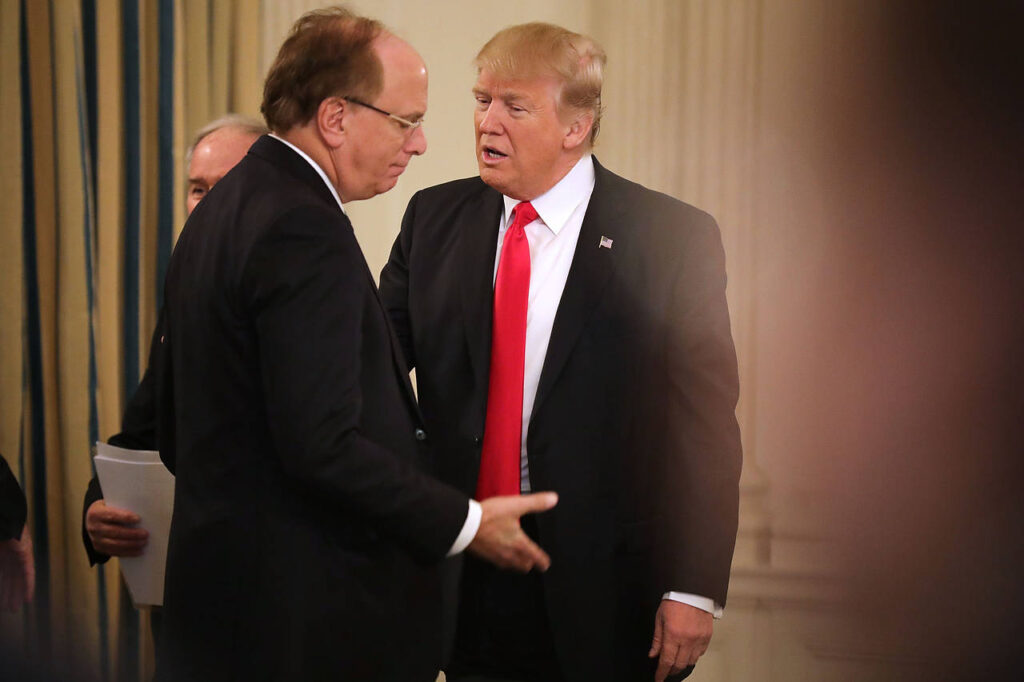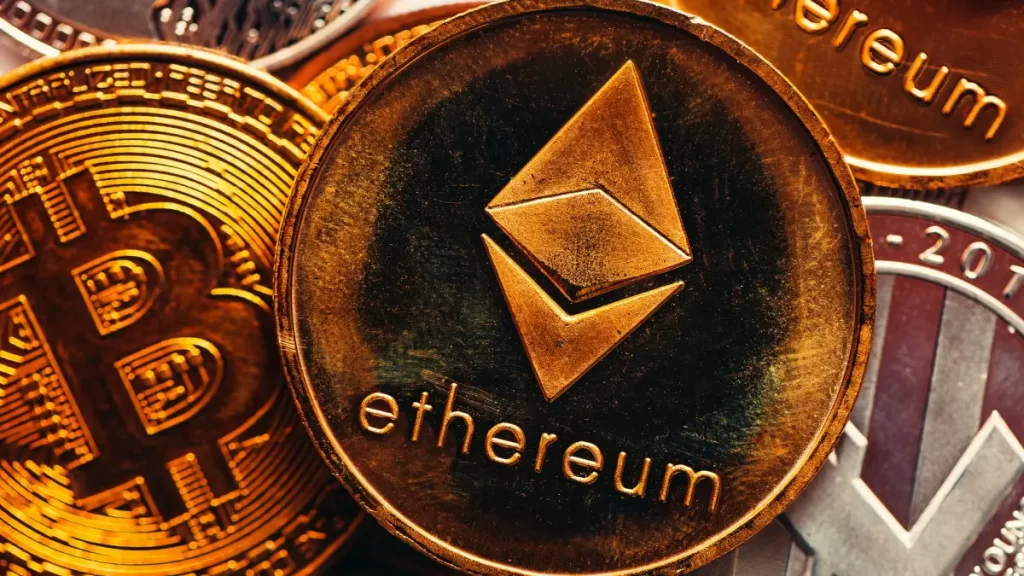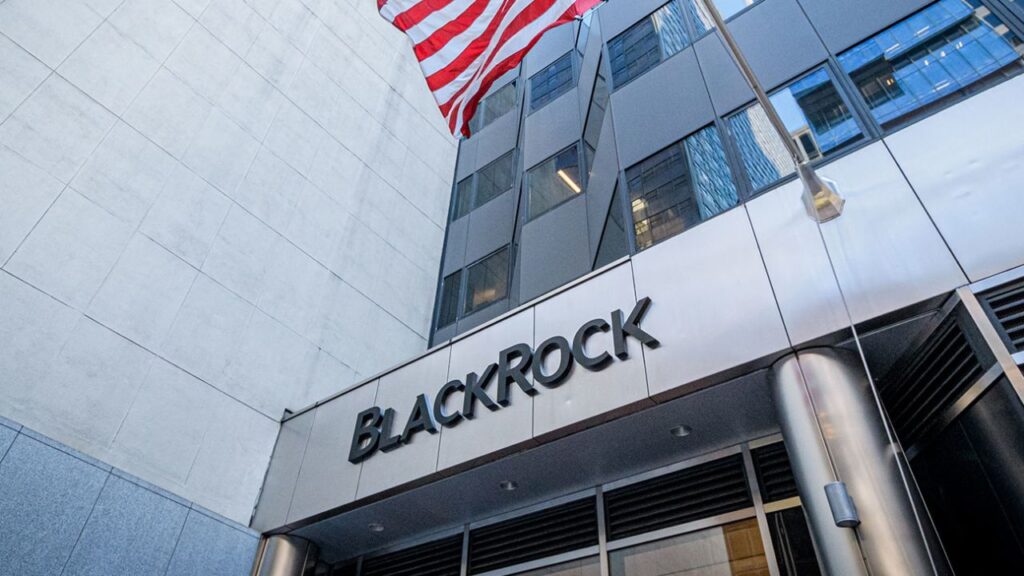Larry Fink, the CEO of BlackRock, the world’s largest asset management firm, recently vocalized his support for cryptocurrencies during an interview on Fox Business.
This comes as BlackRock applies to list a Bitcoin exchange-traded fund (ETF) in the U.S, a move that could revolutionize finance by providing an accessible investment tool linked directly to Bitcoin.
In the interview, Fink characterized cryptocurrency’s role as essentially “digitizing gold”, implying that it could serve as an alternative investment asset that isn’t tied to any specific currency.
He suggested that Bitcoin could provide investors with a way to protect against inflation and currency devaluation, signaling an international asset appeal.
Fink’s commentary on the crypto landscape has been consistent. He has weighed in on various important occurrences within the sector, such as the FTX downfall in 2022 and the growing intrigue surrounding Bitcoin.
READ MORE: Law Firm Seeks Huge Compensation From Voyager Digital’s Creditors
Given BlackRock’s influence, with over $9 trillion in assets under management as of April, Fink’s pro-crypto statements could trigger substantial impacts both within and outside the cryptocurrency domain.
Crypto enthusiasts online have reacted favorably to Fink’s pro-Bitcoin commentary, with some predicting a potential surge in certain asset prices, referred to as the “Fink Pump”.
At the time of the interview, Bitcoin’s price stood at $30,473, a slight 1% decline from the previous 24 hours.
It’s worth noting that under Fink’s leadership, BlackRock has pursued the launch of a Bitcoin ETF, with crypto giant Coinbase as a surveillance partner.
However, the outcome remains uncertain as the U.S Securities and Exchange Commission has previously rejected all spot Bitcoin ETF applications.
Fink’s positive stance on crypto could potentially tip the scales in favor of such advancements, marking a milestone for cryptocurrency integration into traditional finance.
In a recent social media post on July 4, Dmitry Gusakov, the community staking lead for Lido, accused their competitor, Rocket Pool, of excessive centralization.
Lido and Rocket Pool are both liquid staking protocols that enable users to delegate their cryptocurrency to validators and receive derivative tokens in return.
Gusakov’s post highlighted that the Rocket Pool contracts are under the control of the Rocket Pool team, allowing them to modify any parameters and execute any methods.
READ MORE: US Crypto Hub Still Thriving Despite Regulatory Challenges, Says Blockchain CEO
This means that Rocket Pool developers possess the ability to increase the inflation rate to an arbitrarily high percentage or raise fees up to 100%.
Gusakov emphasized that such vulnerabilities do not exist in Lido’s contracts since these actions are “fully controlled by [decentralized autonomous organization] LidoDAO.”
He claimed that the Rocket Pool contracts, on the other hand, grant significant control to the team.
In response to these allegations, Rocket Pool management committee member Waq acknowledged the existence of the vulnerability and assured that it would be addressed in the future.
Waq accused the Lido team of attempting to take credit for identifying an issue that was already known to Rocket Pool.
According to Gusakov’s post, the RocketStorage contract at Ethereum address 0x1d8f8f00cfa6758d7bE78336684788Fb0ee0Fa46 contains a parameter called “guardian.”
Various functions within the Rocket Pool contracts are labeled as “onlyGuardian,” indicating that they can only be called by the account specified in this parameter, which is currently set to the RocketPool deployer account at 0x0cCF14983364A7735d369879603930Afe10df21e.
Gusakov explained that actions that can be performed by the “guardian” include altering the “RPL InflationIntervalRate” and the “ETH DepositFee.”
This implies that the Rocket Pool team has the power to increase the inflation rate of the Rocket Pool governance token (RPL) or potentially manipulate users’ deposits by setting the fee to 100%.
The allegations made by Gusakov were shared by content creator Chris Blec, who argued that they demonstrate that “pDAO is not a DAO” and that RPL tokenholders do not genuinely control Rocket Pool’s governance.
In response, Rocket Pool community advocate Jasper.lens acknowledged the centralization issue and stated that it would be resolved in the upcoming Saturn upgrade.
Jasper explained that during the initial testing phase of Rocket Pool’s DAO voting systems, on-chain voting was not permitted.
However, after completing the testing phase, the upcoming Saturn upgrade is intended to address the centralization concerns.
Supporting Jasper.lens’ statement, Waq commented that the Rocket Pool community has been actively working on fixing the centralization issue for over a year.
Waq also predicted that the Lido team would hastily claim credit for the resolution once it is implemented.
Liquid staking protocols have gained significant popularity in recent months.
DefiLlama, a blockchain analytics platform, reported on May 1 that these protocols had surpassed decentralized exchanges as the leading decentralized finance category in terms of total value locked.
Additionally, Tenet’s partnership with LayerZero on May 30 aims to expand liquid staking implementation to more blockchains in the future.
New York-based law firm McDermott Will & Emery has submitted a compensation claim of $5.1 million to the creditors of Voyager Digital, a bankrupt crypto brokerage firm.
The bill covers legal services provided by the law firm from March 1 to May 13, 2023.
The law firm, in a court filing on July 3, directed the billing of its legal fees to the “Official Committee of Unsecured Creditors.”
According to the court documents, McDermott Will & Emery charged an hourly rate of $1,026.76 for the services rendered during the specified period.
READ MORE: NFT Blue Chip Collections Plummet to Near Two-Year Lows
The bill presented by the law firm encompasses various legal services it offered to Voyager, including providing advice to the committee on its powers and responsibilities under the bankruptcy regulations, attending meetings, and negotiating with debtors’ representatives and other interested parties.
Additionally, the firm was responsible for preparing all the necessary legal documents on behalf of the committee.
This recent bill marks the third and final one from McDermott Will & Emery, with the total compensation amounting to $16.48 million between July 5, 2022, and May 19, 2023. Of this total, $8.97 million has already been paid by the creditors.
It is worth noting that McDermott Will & Emery is not the sole legal service provider for Voyager. On June 28, another legal advisor, Kirkland & Ellis, billed Voyager $1.1 million for legal fees incurred in April.
Despite the request for comments from Cointelegraph, McDermott Will & Emery has not yet provided a response.
Voyager Digital filed for bankruptcy in July 2022 amidst a crisis in the crypto lending sector, which resulted in market turmoil and the downfall of several well-established crypto firms such as Celsius and BlockFi.
At the time of filing for bankruptcy, Voyager disclosed liabilities ranging from $1 billion to $10 billion.
The bankruptcy proceedings have imposed substantial legal fees on various crypto firms, including Voyager.
For instance, FTX, another prominent player in the industry, was billed over $120 million in financial and legal advisory fees between February 1 and April 30, 2023.
This indicates the financial burden faced by crypto companies in navigating the complexities of bankruptcy cases and seeking professional legal guidance to handle their affairs.
A group of crypto and blockchain advocates has published a report urging the Hong Kong government to introduce a stablecoin linked to the Hong Kong dollar, aiming to challenge the dominance of Tether and USD Coin.
The report, co-authored by prominent individuals in the financial innovation field, proposes the issuance of an HKDG (Hong Kong Dollar Government) stablecoin to bolster the government’s efforts in the digital economy.
The authors, including Wang Yang from the Hong Kong University of Science and Technology, Cai Wensheng, the founder of Meitu, Lei Zhibin, an honorary chair of the Hong Kong Blockchain Association, and doctoral student Wen Yizhou, argue that issuing a stablecoin pegged to the Hong Kong dollar would solidify the region’s leadership in the blockchain sector.
READ MORE: Co-Founders of Collapsed Three Arrows Capital Pledge Donation to Creditors
They believe it would enhance transaction efficiency, reduce costs, improve payment systems, and strengthen Hong Kong’s fintech capabilities.
Additionally, they assert that a Hong Kong Dollar stablecoin would increase the efficiency and inclusiveness of the financial system, provide stability, security, and cross-border liquidity, supporting a broader range of financial innovations.
The authors criticize the government’s current strategy of encouraging private institutions to issue stablecoins pegged to the Hong Kong dollar as “too conservative” in comparison to its crypto and blockchain promotion goals.
The report highlights that Hong Kong’s foreign exchange reserves in March 2023 amounted to approximately $430 billion, surpassing the combined market capitalization of Tether and USD Coin, which stood at around $120 billion.
The proposed HKDG, backed by the government, is deemed to possess higher credibility and lower risk compared to existing stablecoins, particularly given concerns about the credibility of Tether and recent discounts experienced by USD Coin.
The authors outline several potential benefits of launching HKDG, including challenging the dominance of the US dollar, providing additional liquidity for government projects, and facilitating risk assessment by officials.
However, the report acknowledges potential risks, such as legal and regulatory challenges, international disputes related to illicit funding, and hacking incidents.
In June, the Hong Kong government established a task force to oversee the development of Web3.
The region has seen growing interest from over 80 digital asset and blockchain-related companies considering establishing a presence in Hong Kong, in addition to the already existing 800 fintech companies.
Overall, the report recommends the issuance of an HKDG stablecoin by the Hong Kong government to propel the region’s digital economy, enhance financial systems, and bolster its position as a leader in the blockchain sector.
Jinan, the capital city of China’s Shandong Province, has taken a significant step towards the widespread adoption of the country’s central bank digital currency (CBDC).
The city has introduced digital yuan payments on all its bus routes, encouraging residents to embrace this new payment method.
Initially, the city conducted a pilot program on two bus lines to test the feasibility of CBDC payments. Following the successful trial, Jinan has now implemented the digital yuan payment system across its entire bus network.
Local media outlet Shunwang-Jinan Daily reported that the city has upgraded its card readers and bus route software to accommodate the CBDC payments.
READ MORE: NFT Blue Chip Collections Plummet to Near Two-Year Lows
To incentivize the use of the digital yuan, Jinan is offering fare discounts to passengers who opt for this payment method.
According to the announcement, passengers can enjoy up to two discounted rides per day and a maximum of six discounted rides per month when using the digital yuan.
This initiative in Jinan is part of a broader nationwide effort to promote the adoption of the digital yuan in China.
Another city, Changshu, recently announced that it would pay civil servant salaries with the CBDC starting from May. This move extends to personnel at all levels of public service, public institutions, and state-owned units.
In addition to bus rides and civil servant salaries, China has implemented its CBDC for the Belt and Road initiative and cross-border trades.
On April 24, the city of Xuzhou issued a plan to promote the use of the CBDC in cross-border trade. Xuzhou serves as a departure point for trains transporting goods to Europe.
In a related development, BNP Paribas, a French bank, has partnered with the Bank of China (BOC) to encourage the use of the digital yuan.
Through this collaboration, BNP Paribas’ corporate clients will have the opportunity to connect with BOC’s system, facilitating real-time transactions using the digital yuan.
The introduction of digital yuan payments on Jinan’s bus routes represents a significant milestone in the promotion of China’s CBDC.
By integrating the digital currency into everyday transactions and expanding its use across various sectors, China is steadily advancing towards a digital economy.
Ethereum is showing a strong upward momentum as its price surges past $1,940 against the US Dollar.
The cryptocurrency has the potential to continue its upward trajectory if it manages to surpass the crucial resistance zone at $2,000.
Currently, Ethereum is steadily moving closer to the $2,000 zone, trading above $1,920 and the 100-hourly Simple Moving Average.
On the hourly chart of ETH/USD, there is a bullish trend line forming, indicating support near $1,945.
If the resistance at $2,000 is successfully breached in the near future, Ethereum could experience a surge of 5% to 8%.
Ethereum’s price recently found a base above the $1,850 support level and initiated a fresh upward movement, outperforming Bitcoin.
READ MORE: EU Lawmakers Approve Controversial Law Despite Crypto Concerns
It surpassed the $1,950 resistance zone, reaching a new multi-day high at $1,975 before consolidating its gains. Although there was a slight decline below $1,965, the price managed to find support.
The immediate resistance for Ethereum is currently near $1,975, followed by a major resistance level at $2,000. A close above $2,000 could potentially trigger a renewed surge, with the next resistance level around $2,050.
Further upward gains could propel the price towards the $2,120 mark, and even higher to the $2,200 resistance level.
However, if Ethereum fails to surpass the $1,975 or $2,000 resistance levels, a downside correction might occur.
In such a scenario, initial support can be found around the $1,950 level and the trend line zone.
The next significant support level lies near $1,930, which aligns with the 50% Fibonacci retracement level of the recent upward movement.
Additionally, the 100-hourly Simple Moving Average also provides support at this level.
Further downward movement could lead to a drop towards the $1,900 mark, and if the bearish sentiment persists, Ethereum may find support around $1,880.
As Ethereum continues to display positive price action, investors are closely watching its performance and assessing the potential for further gains.
The Law Commission of the United Kingdom is advocating for the establishment of a unique category of personal property that caters to the distinct characteristics of cryptocurrencies and digital assets.
In response to a directive from the British government, the commission conducted a comprehensive analysis of common law frameworks in England and Wales to determine how they can effectively accommodate digital assets, including non-fungible tokens (NFTs) and cryptocurrencies.
The most notable recommendation put forth by the commission is the creation of a fresh and distinct category of personal property specifically for digital assets.
The commission intentionally refrained from defining clear boundaries for this proposed category, asserting that the determination of which digital assets fall within this framework should be left to the discretion of the U.K.’s common law system.
According to a statement released by the commission and shared with Cointelegraph, the introduction of a new personal property category would enable a nuanced approach to recognizing a broad spectrum of digital assets, ranging from cryptocurrencies to digitized instruments like carbon emission credits or export quotas.
READ MORE: NFT Blue Chip Collections Plummet to Near Two-Year Lows
In addition to this, the Law Commission proposed the establishment of a panel consisting of industry-specific technical experts, legal practitioners, academics, and judges.
This panel would be responsible for providing non-binding advice to courts regarding various legal issues and considerations pertaining to the digital asset sector.
Another key recommendation put forth by the commission is the development of a tailored legal framework aimed at facilitating the operation and enforcement of collateral arrangements.
Lastly, the commission called for statutory law reforms that would provide clarity on whether specific digital assets fall under the purview of the U.K.’s Financial Collateral Arrangements Regulations of 2003.
The Law Commission’s review of the legal challenges associated with the cryptocurrency sector commenced in October 2022 at the request of the Ministry of Justice.
Subsequently, in March 2023, the U.K. Treasury and Home Office announced their intentions to implement robust regulations on the cryptocurrency sector to combat its potential misuse for criminal activities.
Asset management giant BlackRock’s recent filing for a Bitcoin exchange-traded fund (ETF) has taken an interesting turn with the inclusion of a “surveillance-sharing agreement” with Coinbase, a leading cryptocurrency exchange.
The filing, made on June 29 with the United States Securities and Exchange Commission (SEC), requested a rule change to allow the listing of BlackRock’s Bitcoin ETF on the Nasdaq stock exchange.
The document revealed that a June 8 agreement between Nasdaq and Coinbase was designed to enhance the exchange’s market surveillance program and grant access to data on spot Bitcoin trades.
READ MORE: NFT Blue Chip Collections Plummet to Near Two-Year Lows
This announcement followed ARK Investment Management’s amendment to its own spot Bitcoin ETF application, which incorporated a surveillance-sharing agreement with the Chicago Board Options Exchange (Cboe) and an undisclosed U.S.-based crypto exchange.
Speculation arose that the agreement was with Coinbase, potentially conflicting with BlackRock’s ETF application.
On June 30, the SEC reportedly stated that the crypto ETF filings with Nasdaq and Cboe were insufficiently clear and comprehensive, urging the applicants to provide additional information on surveillance arrangements.
It is worth noting that BlackRock initially submitted its application for the spot Bitcoin ETF on June 15.
Despite several market participants submitting ETF applications linked to cryptocurrency investments, the SEC has yet to approve any spot ETF related to crypto.
In response to the denial of its spot Bitcoin ETF in June 2022, Grayscale Investments filed a lawsuit against the SEC, accusing the regulator of applying inconsistent treatment to similar investment vehicles.
The inclusion of surveillance-sharing agreements in these recent ETF filings reflects a growing emphasis on market surveillance and investor protection.
Regulators are keen to ensure that proper monitoring mechanisms are in place to prevent market manipulation and illicit activities within the crypto space.
By partnering with trusted cryptocurrency exchanges like Coinbase, BlackRock and ARK Investment Management aim to address the SEC’s concerns and provide a transparent and secure environment for investors looking to access Bitcoin through regulated investment vehicles.
As the SEC continues its evaluation of the latest ETF filings, the crypto industry eagerly awaits a breakthrough in the approval of a spot Bitcoin ETF, which could potentially open up new avenues for institutional and retail investors to participate in the crypto market.
In the dynamic landscape of decentralized finance (DeFi), innovation and adaptability are key. As businesses and individuals alike seek to navigate this new frontier, they require robust, secure, and user-friendly tools to facilitate their journey. One company that stands at the forefront of this revolution, providing the infrastructure necessary for businesses to thrive in this new era of finance, is AllianceBlock.
Pioneering Decentralized Tokenized Markets
Since its inception, AllianceBlock has been a trailblazer in the world of DeFi, building an end-to-end infrastructure for decentralized tokenized markets. This innovative platform empowers businesses of all sizes to tokenize assets and compliantly issue, manage, and trade in an inclusive financial ecosystem. AllianceBlock’s services include a trustless KYC/AML module, a holistic DeFi Terminal, a trustless identity verification system, etc.
Moreover, the platform features a Data Tunnel, a compliant peer-to-peer (P2P) funding system, full regulatory compliance for cross-border transactions, and a DEX & Bridge, offering various functionalities.
The platform offers easy setup and integration, allowing businesses to start quickly with off-the-shelf solutions or seamlessly integrate with development kits to accelerate their objectives. Moreover, AllianceBlock’s technology is secure, decentralized, and compliant by design, making it a reliable choice for businesses venturing into the DeFi space. To ensure compliance with global financial regulations, AllianceBlock has implemented the Prometheus Protocol, a multi-layered architecture that facilitates capital transfer across borders in a legally compliant and regulated manner.
The Evolution of Brillion: A Case Study in Growth
One of the most exciting developments in AllianceBlock’s journey in the recent past has been its partnership with Brillion, a self-custodial wallet aiming to bridge billions of users to the future of finance. Brillion, which started as dua Pay — a remittance and cross-border payments solution — has evolved into a much larger brand aiming to facilitate the financial inclusion of billions of people.
AllianceBlock’s technology has been instrumental in this transformation, providing solutions for cross-border activity, regulating token issuance, offering compliant DeFi solutions, fund distribution, and regulating digitized derivatives, among others.
Brillion’s mission is to help billions of people bridge into web3 with the right tools that help them navigate the ecosystem with full control of their assets, identity, and data.
The wallet supports multiple networks and offers novel recovery features via connected credentials such as social media accounts and emails. It also provides identity management and verification in-app (KYC), ensuring that users are in control of their data, how much they share, and whom they share it with.
AllianceBlock and Brillion: A Strategic Partnership
From the getgo, AllianceBlock’s suite of products has been instrumental in Brillion’s evolution. The partnership began in 2022 when Brillion used AllianceBlock’s technology to develop a wallet for its large user base. The collaboration has opened doors to new opportunities outside of Brillion’s user base, resulting in new ideas and solutions that exceeded the limits of a single wallet and clientele.
AllianceBlock’s product lineup, including its aforementioned DeFi Terminal, the Fundrs app, and its fully functional DEX, has played a significant role in this collaboration. The DeFi Terminal allows users to participate in liquidity mining and staking, offering rewards for their participation. The Fundrs app is a decentralized crowdsourcing platform that enables capital seekers and providers to collaborate from the early stages of project development. The AllianceBlock DEX, on the other hand, offers a peer-to-peer marketplace where users can swap tokens without using an intermediary.
Furthermore, to enhance the interoperability of different blockchain networks, AllianceBlock recently launched AllianceBridge, a decentralized solution that enables communication between disparate blockchain networks to achieve various economic goals.
🌟 Meet our official wallet @BrillionFi: A prime example of growth within our ecosystem! We empower companies to build on our robust infrastructure, we guide them through the crypto space's challenges, helping them unlock their full potential & fuel their growth and success $NXRA https://t.co/hSSeHuZLER
— AllianceBlock (@allianceblock) June 18, 2023
Looking Ahead
In conclusion, AllianceBlock has proven to be a significant player in the DeFi space, providing a range of solutions that cater to the needs of both businesses and individuals. It has set an example of how blockchain technology can be leveraged to foster financial inclusion and create a more equitable financial system. With continued innovation and a commitment to user-centric design, AllianceBlock is poised to shape the future of decentralized finance.
European Union (EU) lawmakers have given the green light to the contentious European Data Act, despite prior criticism from the crypto community.
The act aims to promote the utilization of data resources for algorithm training and proposes updates to the EU’s smart contract regulations, including the introduction of a kill switch option for secure termination.
This move, however, has sparked concerns as it contradicts the fundamental principle of trust in smart contracts.
Simultaneously, the European Commission has presented a legislative plan for the digital euro, with the goal of establishing it as a widely accepted and easily accessible payment method.
The proposal emphasizes that individuals will have the ability to obtain digital euros through their banks upon request, ensuring convenient access and preventing exclusion.
The plan also incorporates provisions for free basic digital euro services, privacy protection, and offline payments.
Despite these developments, the crypto landscape in Europe does hold some positive news, particularly at the local level.
For instance, the National Council of Slovakia has passed an amendment to reduce personal income tax on profits derived from the sale of cryptocurrencies held for a minimum of one year.
The tax rate will be lowered to 7%, a significant decrease from the existing sliding scale of 19% or 25%.
Additionally, payments received in cryptocurrencies up to 2,400 euros ($2,600) will be exempt from taxation.
In the ongoing legal dispute between Coinbase, a major American cryptocurrency exchange, and the United States Securities and Exchange Commission (SEC), Coinbase has submitted a motion seeking the dismissal of the SEC’s complaint.
In a legal document filed with the United States District Court for the Southern District of New York, Coinbase raises concerns regarding the SEC’s interpretation of securities laws, suggesting that the agency has exceeded its legal authority.
Coinbase’s motion asserts that the SEC’s actions represent an extraordinary abuse of process. The exchange argues that the SEC’s attempt to regulate cryptocurrencies as securities goes beyond its purview and disregards the decentralized nature of these digital assets.
Coinbase contends that the SEC’s actions lack legal basis and have a chilling effect on innovation and competition in the cryptocurrency industry.
The outcome of this legal battle will undoubtedly have significant implications for the regulatory landscape surrounding cryptocurrencies in the United States, as well as potential ripple effects globally.
The case highlights the ongoing struggle between regulators and cryptocurrency platforms seeking clearer guidelines and a balanced approach to foster innovation while ensuring investor protection.
Other Stories:
Binance’s Reversal on Delisting Privacy Coins Marks a Major Win for Privacy Advocates
Bittrex Copies Coinbase As It Challenges SEC’s Authority in Legal Dispute












